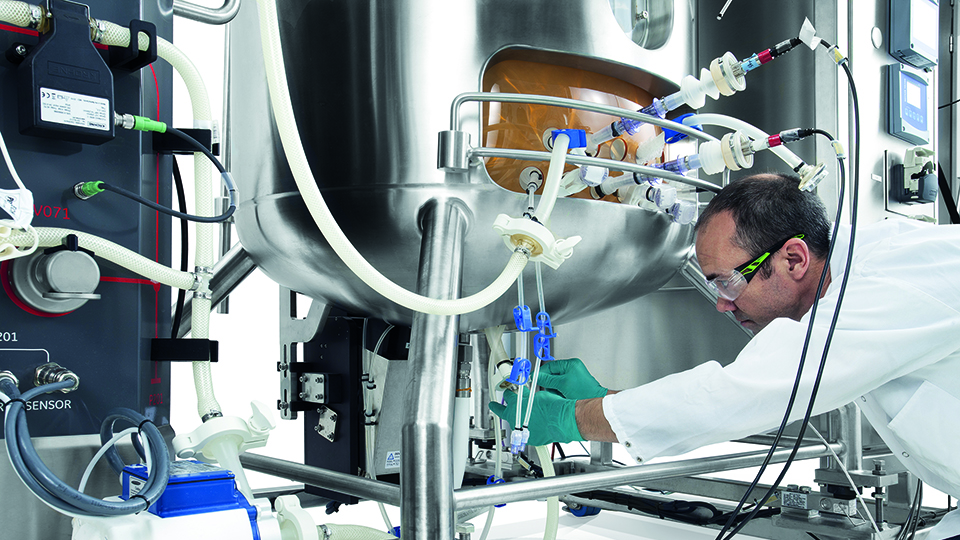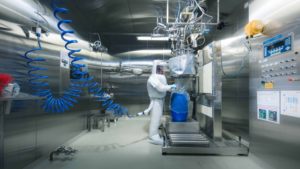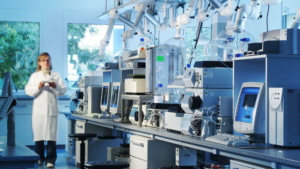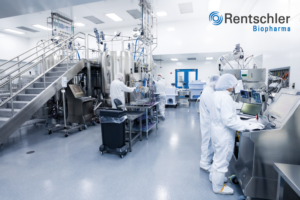
A “Pure Play” Biologics Swiss-based CDMO
The biologics contract development and manufacturing (CDMO) market is experiencing rapid growth and is dominated by global players with investments in large scale stainless steel capacity. But is larger always better? Not necessarily says Celonic, a mid-sized, privately owned CDMO, who has been embracing next generation technologies to help small to large biotech customers bring their drugs reliably, effectively and efficiently to the market.
The Celonic Group is a fast rising, mid-sized biologics CDMO focusing uniquely on mammalian expressed drugs. It provides end to end drug substance development and manufacturing solutions for monoclonal antibodies, bispecifics and other complex molecules from development all the way to commercial supply. Celonic combines the expertise like larger CDMOs with the agility and a collaboration mindset of a family owned business. The Celonic Group is privately-owned and part of the independent German family business J. Rettenmaier & Söhne Group (JRS). Celonic’s history is a success story. Over 30 years, the company has continuously expanded from research projects to GMP manufacturing.
Celonic’s roots trace back to the world renowned Max Planck Institute and the Jülich Research Institute in Cologne, Germany more than three decades ago. In 2011, the JRS Group acquired Celonic AG headquartered in Basel, Switzerland, followed by the acquisition of Glycotope in 2017 which provided the company its current GMP manufacturing site in Heidelberg, Germany. Today, Celonic has a state-of-the-art Biologics Development and Innovation Center (BDC) in Basel, Switzerland, and clinical and commercial GMP manufacturing facilities in Heidelberg, Germany. At present, more than 500 highly qualified employees work at Celonic across the two locations.
Market trends
In the past decades, Biologics manufacturing has seen an advent of disposable single-use technology (SUT). The industry practice has been to utilize disposables for development and small scale clinical or launch supply, and then scale up to large scale stainless steel for market supply. One of the key benefits of integrated single-use solutions is its flexibility and minimizing lengthy changeover times between products or batches coupled with the reduced risk of cross-contamination which helps to avoid costly downtime and the risk for failed batches. Its main drawback is higher costs per gram of the pharmaceutical active ingredient driven by the smaller scales and the cost of consumables. However, a number of market factors are shifting, making it easier for bio-manufacturers and CDMOs to adopt single-use technologies and further broaden its appeal.
First, is the trend towards increased protein titers. Historically companies developed blockbuster drugs with very low titers, often in the 0.5 to 1 g/L range. Today, with improvements in expression platforms, new processes routinely achieve titers in the 2 to 5 g/L range and sometimes even titers exceeding 8 to 10 g/L with process optimization. Higher titers means that commercial demand for these new molecules can be addressed with smaller size bioreactors.
Second, is the portfolio mix of new generation drugs. While historically the market was driven by large blockbuster standard monoclonal antibody (mAb) drugs, which required up to a ton of drug substance, newer molecules are more diverse, more complex, and in general require less volume with the possible exception of new large indications (e.g. Obesity, Alzheimer’s). With scaling out (e.g. multiplexing 2,000L reactors), it is estimated that single-use facilities can address nearly two thirds of all new mammalian molecules including some biosimilars, ranging from niche orphan indications all the way to hundreds of kilograms, providing flexibility and speed to market without the need for technology transfers between sites or assets.
Third, is increased scrutiny by pharma and biotech company shareholders and industry watchdogs on sustainability, demanding that bio-manufacturers and CDMOs adopt stricter sustainability practices, and explore how to adapt manufacturing processes to minimize environmental impact. Stainless steel-bioprocessing has significantly higher process mass intensity (PMI) versus single-use technology standard fed-batch processes. PMI is defined as the total mass of materials used (raw materials, consumables, water and ancillary products) to produce 1 kg of active drug substance. This is because the high amount of water and steam required by stainless steel-bioprocessing during cleaning- and steam-in-place (CIP and SIP) and its larger facility footprint relative to a disposable facility. With global warming, long term water scarcity is becoming increasingly a concern worldwide. The consequence is that some companies are starting to evaluate their decisions based on the combination of speed, flexibility, sustainability, and cost of goods per gram rather than cost of goods per gram alone, which provides additional momentum for single-use technology.
Next generation technologies
Georg Blaser, VP of the Celonic Biologics Development Center, is passionate about next generation technologies. After a successful 13 year long career at a larger well-known CDMO, Georg joined Celonic to bring his vision of accelerating the adoption of next generation technologies in the biologics CDMO market. He states “Next generation technologies enable improved bioprocessing productivity leveraging the flexibility of disposable technology with lower cost of goods per gram versus standard fed-batch processes. Simply put, it is about getting more for less”. Next generation technologies include process intensification which uses a perfusion-based cell culture process in the N-1 reactor as well as full perfusion which refers to perfusion in the N stage reactor. Separately, the downstream processes can also be intensified using latest generation resins as well as other optimisations.
Expression systems
Getting more for less starts with a robust expression platform to deliver solid base titers. Blaser explains “Celonic’s GS-CHOvolution® offers a gene-edited Chinese Hamster Ovary (CHO) K1 cGMP-compliant cell line with Glutamine Synthetase genes (“GS”) knocked-out, combined with TnT transposon technology, which facilitates the selection of high expressing clones during cell line development, resulting in higher titers”. The GS selection system is recognized by regulators as the industry standard for the manufacture of biologics, it offers accelerated cell line development timelines with high efficiency cell line screening, and is a robust and scalable platform with no glutamine supplementation required. Blaser is quick to point out that, Celonic’s GS-CHOvolution® has a simplified milestone based licensing model without any royalties, which is attractive to many small to large biotech companies.
Process intensification
Intensified fed-batch, also known as N-1 perfusion, has been discussed in whitepapers and conferences for many years now. However, very few companies have actually adopted it in reality. Celonic is different. It recently inaugurated a new Biologics Development Center with the aim of developing and optimizing processes using process intensification via perfusion technology. Perfusion bioprocessing involves exchanging fresh medium for spent medium within a bioreactor while retaining the cells, allowing for higher-cell densities and lower concentrations of waste product inside the bioreactor.
Extending the duration of the N-1 step and applying a perfusion cell culture process allows operating the N bioreactor such that it results in higher titers, a reduction in cycle time or both. Specifically, Celonic has developed a proprietary toolbox based on multiple molecules types, cell lines, media and feed systems which has demonstrated the doubling of titers, improvement in downstream capture step productivity by 50%, and a reduction of cost of goods per gram of up to 30 to 40% versus a traditional fed-batch process. At the same time these improvements significantly reduce process mass intensity (PMI) and thereby, improve sustainability.
Full perfusion
Celonic has been a pioneer in perfusion-based technologies for decades. The company has run GMP manufacturing for full perfusion up to 1,000L SUT scale and has produced over 50 batches above 50L using CHO and GEX cell lines. Celonic has run perfusion processes up to 40 days, handling up to 60,000L of bulk harvest. Celonic uses state of the art alternating tangential flow (ATF) cell retention devices from Repligen. A full perfusion process can increase total output by a factor of eight to tenfold and significantly reduce cost of goods per gram. This means a 1,000L SUT bioreactor perfusion process can compare itself to a 10,000L Stainless Steel Bioreactor in terms of output. Historically, full perfusion was reserved for hard to manufacture, so called labile molecules such as blood factors. Today, perfusion can be applied to even standard monoclonal antibodies and biosimilars that seek to get large scale volumes with the flexibility provided by disposable systems.
GMP manufacturing
Celonic has more than 20 years experience in GMP manufacturing. Whether a scale-up from a small scale or a straight technology transfer at scale from a third party, Celonic’s multifunctional expert team can help to bring customer’s products speedily and reliably into Celonic’s Heidelberg Site. Celonic’s small scale asset provides 200L SUT up 1,000L SUT scale bioreactors ideal for IND filings. Celonic’s new mid-scale 6 x 2,000L SUT asset offers opportunities to scale up and scale-out which minimizes inter-site technology transfer times and provides a faster pathway to PPQ and Marketing Authorization Approval. Both assets are equipped to handle process intensified processes as well as traditional fed-batch. The Celonic manufacturing assets use Cytiva’s Xcellerex XDR single-use bioreactor system.
Cytiva: the technology enabler
As an industry innovator, Cytiva understands the immense responsibility you have when it comes to advancing human health. That’s why Cytiva is Celonic’s ideal solutions provider and scientific thought collaborator. Their technologically advanced solutions offer flexibility, capacity, quality, and efficiency, helping you accelerate your clinical and commercial milestones.
The Cytiva Xcellerex™ XDR Bioreactor single-use system is designed to scale from process development to full-scale manufacturing. Its robust and flexible system integrates with the Xcellerex™ Automated Perfusion System (APS) to ensure consistent production during continuous manufacturing processes. The system’s automation capabilities include filter switching, liquid management and cell bleed which reduces risk for human error and increases process robustness. ÄKTA ready™ XL single-use chromatography system is designed to meet the capacity demands from single-use upstream processes (2,000L high-titer feeds). ÄKTA ready XL operates large scale columns (up to 1200 mm), using the two flow kit sizes that cover a broad range of flow rates from 45 to 3,500 L/h. The single-use flow path minimizes the need for cleaning and cleaning validation, allowing for quick changeover between productions, while eliminating the risk of carryover. ÄKTA ready XL offers the accuracy and documentation required for use in a GMP-regulated environment.
Company Info:
If you would like more information about our services or company, please contact us:
Eulerstrasse 55,
4051 Basel, Switzerland
Elisa Witt Marketing and Communications
Email: ceo.office@celonic.com
www.celonic.com
This advertorial was originally published in European Biotechnology Magazine Autumn 2024.


 Lonza Group
Lonza Group Vetter Pharma
Vetter Pharma Rentschler Biopharma SE
Rentschler Biopharma SE